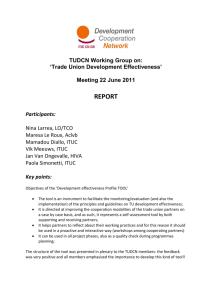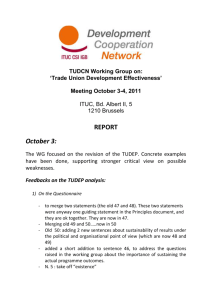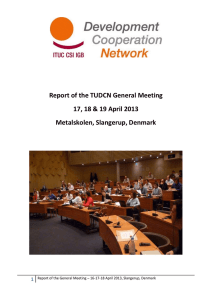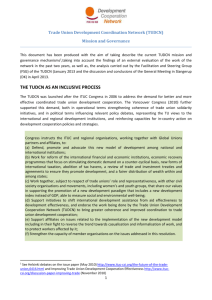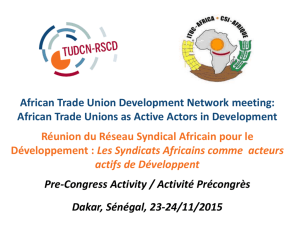Outcome and impact measurement in Trade Union development
advertisement
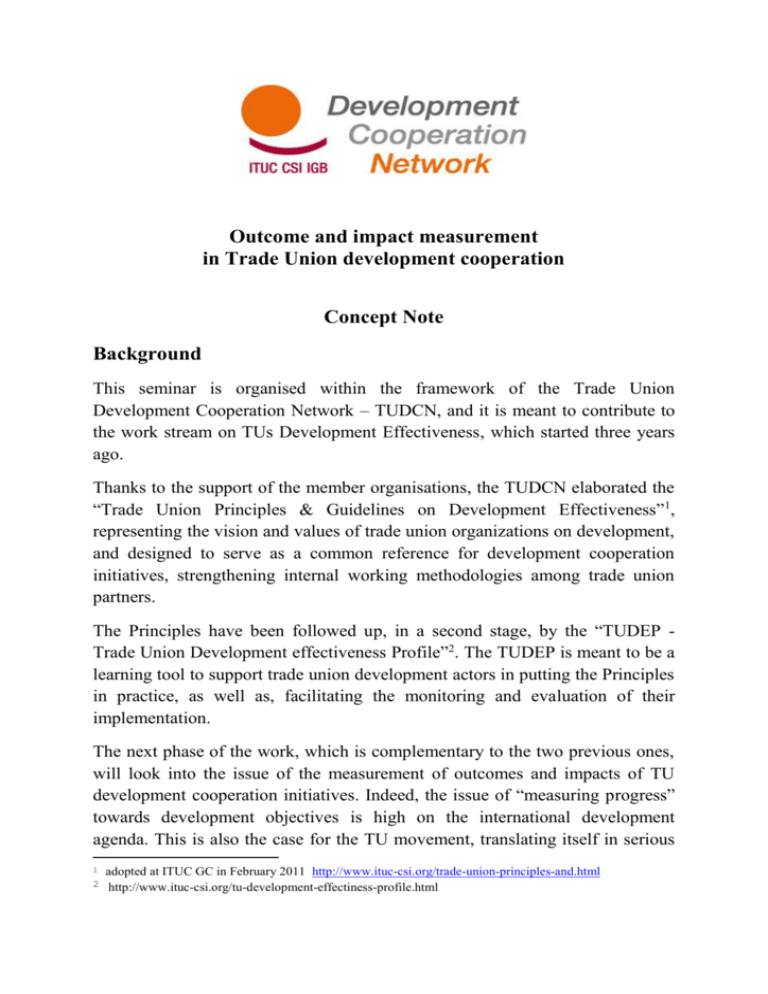
Outcome and impact measurement in Trade Union development cooperation Concept Note Background This seminar is organised within the framework of the Trade Union Development Cooperation Network – TUDCN, and it is meant to contribute to the work stream on TUs Development Effectiveness, which started three years ago. Thanks to the support of the member organisations, the TUDCN elaborated the “Trade Union Principles & Guidelines on Development Effectiveness”1, representing the vision and values of trade union organizations on development, and designed to serve as a common reference for development cooperation initiatives, strengthening internal working methodologies among trade union partners. The Principles have been followed up, in a second stage, by the “TUDEP Trade Union Development effectiveness Profile”2. The TUDEP is meant to be a learning tool to support trade union development actors in putting the Principles in practice, as well as, facilitating the monitoring and evaluation of their implementation. The next phase of the work, which is complementary to the two previous ones, will look into the issue of the measurement of outcomes and impacts of TU development cooperation initiatives. Indeed, the issue of “measuring progress” towards development objectives is high on the international development agenda. This is also the case for the TU movement, translating itself in serious 1 2 adopted at ITUC GC in February 2011 http://www.ituc-csi.org/trade-union-principles-and.html http://www.ituc-csi.org/tu-development-effectiness-profile.html efforts to strengthen its capacity to monitor and evaluate its contribution to development processes. Therefore, the aim of this seminar will be to develop monitoring and evaluation strategies at outcome and impact level, including indicator sets, in this way supporting the ongoing improvement of the M&E practices by TUs in this area. Objective Nowadays Decent Work is recognized by governments and donors as being one of the main policy priorities in development. The DWA pillars will be taken as point of reference for the formulation of an overall M&E framework at outcome and impact level, as they represent the natural context for TUs initiatives in development. Building up an M&E framework with indicator sets on the attainment of DWA objectives will certainly support the strength of TUs in better targeting their actions for socio-economic development in the contexts where they operate. Moreover, more coherence in the strategies for outcome and impact measurement will also support TU’s capacity to learn from previous actions, and in showing results on their progress towards the DWA objectives. On this basis, the formulation of an M&E framework at outcome and impact level will serve to: Assess progress in achieving results at various levels, and use these insights for learning and improving the programmes; Assess their contribution in terms of DWA objectives; Set a common and shared approach on how to measure at these levels. Methodology The seminar is connected to an action research project which consists of a number of preparatory activities: Carry out a mapping of the current M&E practices and indicators by TUs at outcome and impact level. This analysis forms the basis to identify the strengths and weaknesses of the current approach. Missing elements in the M&E will be subsequently identified, leading to sets of indicators that can be used for M&E at outcome and impact level. The research also presents an overall framework with suggestions for M&E at outcome and impact level: the agenda, the underlying values and principles, the concepts, tools, and methods, and guidelines for the implementation. During the seminar this research process will be reviewed and enriched with additional experiences for internal and external stakeholders: Take stock of what practices institutional actors are undertaking in assessing progress towards development goals. This will contribute to useful knowledge sharing and capacity building across organizational boundaries: The ILO is intensively working on indicators on DW. The Policy Integration Department in Geneva is currently implementing the project ‘Monitoring and Assessing Progress on Decent Work’ (MAP) with funding from the European Union. Over a period of four years (2009 to 2012), the project aims to facilitate the identification of decent work indicators that are relevant at the national level; support data collection; an integrated policy analysis of decent work in order to make them relevant for policy-making; production of a manual on the global methodology to self-monitor progress towards decent work. The project covers ten countries in all major regions: Africa, Asia, Europe, Latin America. The OECD Development Centre has also produced a variety of studies and analysis on measurement of progress of societies and how it can be measured in open, bottom-up processes. Some examples at sector level, like on gender, social cohesion, as well as, more holistic indexes on wellbeing. Get the perspective and feedbacks from TUs partner in the South on M&E framework and indicators, building on local capacities (pilot studies) Seminar: Programme proposal The TUDCN will organize an ‘ad hoc’ seminar aimed at contributing to the work path described above on a TUs M&E framework. The seminar will be open to ITUC/TUDCN members both in the North and in the South. The seminar is focusing on two main issues: 1) TU Development Effectiveness Profile Tool (TUDEP): Strengthening the operational capacity and strategy for the implementation of TUDEP 2) Monitoring & evaluation: a. Developing a coherent and practical strategy for outcome and impact measurement in a trade union context b. Exchanging with external stakeholders on M&E strategies and indicators The seminar will be open to ITUC/TUDCN members both in the North and in the South. *************

